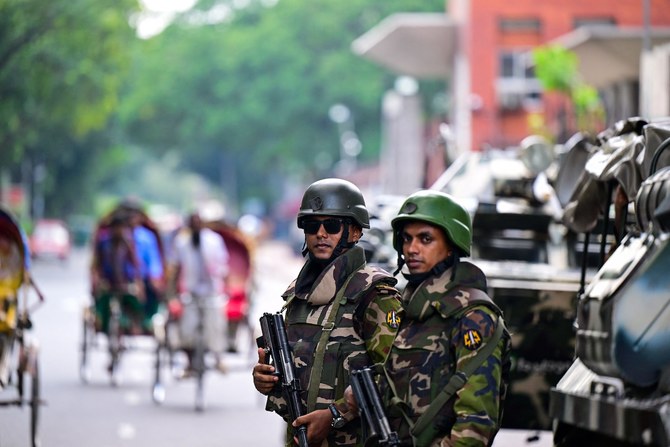DHAKA: Bangladeshi police have discharged from hospital and arrested the leaders of a student protest that led to nationwide unrest last week, when security forces clashed with demonstrators.
Students have been demonstrating since the beginning of July against a rule that reserves a bulk of government jobs for the descendants of those who fought in the country’s 1971 liberation war.
At least 209 people have been killed and thousands injured, according to a count based on reports in the local media after the protests turned violent last week.
Most of the casualties were reported in Dhaka, which saw intense clashes between protesters, government supporters, police and paramilitary troops, when the country went into a communications blackout for six days.
Among the injured were student leaders Nahid Islam and Asif Mahmud, coordinators of Students Against Discrimination, the main protest organizing group. They were patients at Gonoshasthya Hospital in Dhaka, from where they were arrested by the Detective Branch of Dhaka Metropolitan Police on Friday evening. Another student leader visiting Islam and Mahmud, Abu Baker Majumder, was detained as well.
Detective Branch chief Harun Or-Rashid told reporters in Dhaka on Saturday that the trio had been detained “for security reasons” as their families were worried about their safety.
“We took them in our custody to keep them safe,” he said.
The student leaders were arrested by a group of more than a dozen plainclothes officers despite objections from medical staff, a hospital worker told Arab News.
“At first, we tried to make them understand that without proper protocols, admitted patients couldn’t be released from the hospital. Later on, they talked with our authorities, and the students were taken from the hospital. There was no way we could hold them further,” the hospital worker said on condition of anonymity.
“The students’ health was not so good ... Asif was dealing with low blood pressure, and Nahid was suffering from blood clots and bruises on different parts of his body. Both of them needed further treatment.”
The arrests come in a crackdown launched by police in Dhaka, where a curfew imposed last week was still in place.
Liton Kumar Saha, joint commissioner of the Dhaka Metropolitan Police, said that 2,284 people have been arrested in Dhaka over the protest-related clashes, in which numerous administration offices were set on fire.
“We are analyzing the footage of different places and identifying the miscreants. When we get confirmed about someone’s involvement in the anarchy, we conduct the operations to arrest them. It has been conducted with transparency, and we are checking the people who were involved with sabotage,” he told Arab News.
“In the last 24 hours, 245 persons were arrested in Dhaka. Our drive will continue until the situation gets normal.”
International rights groups have repeatedly raised concerns over Bangladesh’s handling of the protests, with Amnesty International saying that witness testimonies and video and photographic evidence “confirm the use of unlawful force by the police against student protesters.”
The protests broke out after the High Court upheld a controversial quota system, in which 56 percent of public service jobs were reserved for specific groups, including women, marginalized communities and children and grandchildren of freedom fighters — for whom the government earmarks 30 percent of the posts.
The Supreme Court last week scaled back the quota system, ordering 93 percent of government jobs to be allocated on merit.
























